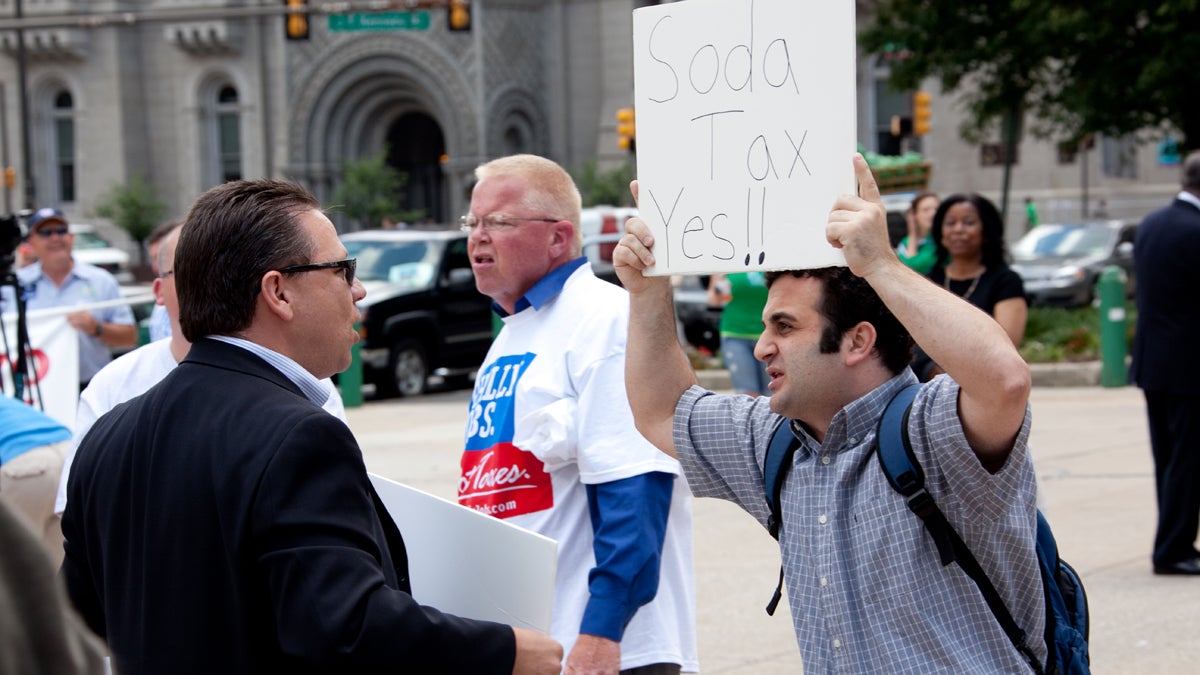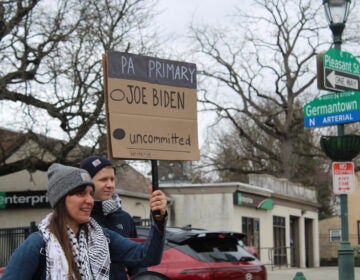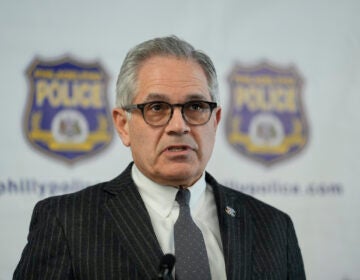Philadelphia passes sweetened drinks tax
Listen
A soda tax supporter outside City Hall in Philadelphia (NewsWorks file photo)
It’s official: Philadelphia has passed a sweetened drinks tax.
City Council voted 13-to-4 to pass the 1.5 cents-per-ounce tax on sugary and diet beverages to help pay for expanded pre-K, a major investment in parks, recreation centers and libraries and other initiatives.
Mayor Jim Kenney, who proposed the tax expected to generate about $90 million next year, said he feels gratified by the vote.
“It’s been generations that we’ve been going downhill with our kids and our neighborhoods, and it’s going to take us time to get us back but this is the first step back,” said Kenney shortly after the Thursday afternoon vote. “I’m very, very proud of everyone sitting up here and those who voted for it — and even those who didn’t vote for it.
“Because we have other things to do that are going to be hard, and we need to all stick together even when we don’t agree with each other.”
Kenney’s attributed successful passage of the tax to a focus beyond the health benefits of cutting down on sweetened drinks.
His predecessor, Michael Nutter, tried that tack twice and failed to convince City Council.
The key, Kenney said, was tying the tax to “things the community cares about,” including expand pre-K classes, community schools and recreation centers.
Legal challenge looms
But the fierce fight over the “soda tax,” fueled by ad campaigns and lobbying efforts, may not be over.
The soda industry, which spent more than $4 million on ads against the tax, is already vowing a court challenge.
“We¹re obviously incredibly disappointed that City Council would pass this tax,” said Anthony Campisi, a spokesman for the No Philly Grocery Tax campaign, which is funded by the American Beverage Association. “We think it’s unconstitutional, former [Pennsylvania Supreme Court] Chief Justice Castille thinks it’s unconstitutional, and so we’re going to take the city to court to protect low-income families in Philadelphia and Philadelphia small businesses.”
The industry has two arguments. One, that the tax violates a clause in the state Constitution that says a tax can’t target a single item.
The city argues there is some wiggle room in that clause if the tax is considered “just.”
City solicitor Sozi Tulante said, considering that drinking large quantities of sugary beverages is associated with health problem such as diabetes, the tax would be justified.
The second argument the soda industry makes is that these drinks are already subject to the state’s sales tax, and that it’s illegal for the same items to be taxed twice.
The city has contended it is not a sales tax because it would be levied on the beverage distributors that sell to retail stores. (Some portion of the tax will likely be passed on to consumers.)
Bring on the legal battle, said Kenney.
“We’re ready,” he said. “We believe we’re on strong legal ground. We’ll see what they do, how they approach it. They spent a long time twisting the facts of this debate on television with millions of dollars, so we’ll fight the next fight when it comes.”
Philadelphia Federation of Teachers president Jerry Jordan lauded the vote.
“We cannot overstate the value of quality early childhood education,” he said in a statement. “Children who have access to pre-K programs not only perform better in grades K-12, but are also more likely to attend college, and less likely to fall victim to the school-to-prison pipeline.
Kenney said he plans to sign the tax into law on Monday.
It could go into effect Jan. 1.
WHYY is your source for fact-based, in-depth journalism and information. As a nonprofit organization, we rely on financial support from readers like you. Please give today.




